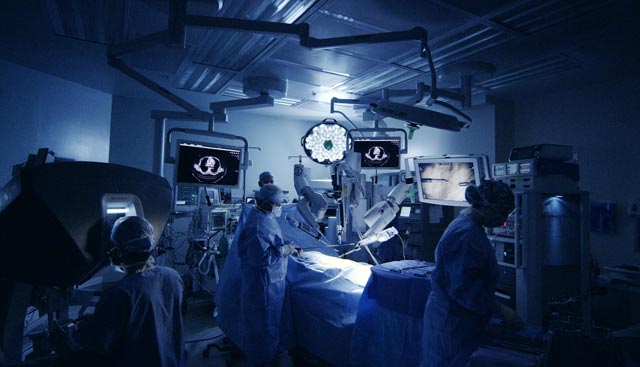Surgery for Esophageal Cancer

Surgery is the main form of treatment for esophageal cancer, although the extent of surgery can vary considerably by patient. Surgical treatment may be supplemented with other therapies, such as chemotherapy and radiation therapy, to address any cancer cells that remain after surgery.
In esophageal cancer patients, surgery may be performed to remove:
- Small tumors – If the cancer has not spread beyond the superficial layers of the esophagus, a procedure to remove the tumor and a minimal amount of surrounding healthy tissue may be all that is recommended.
- A portion of the esophagus – The majority of esophageal patients undergo a surgery to remove the section of the esophagus that contains the cancer as well as nearby lymph nodes. This procedure is known as an esophagectomy.
- A portion of the esophagus and the upper section of the stomach – An esophagogastrectomy may be recommended for patients with more advanced esophageal cancer. During this procedure, the affected portion of the esophagus, nearby lymph nodes and the upper section of the stomach are removed.
Esophageal cancer surgery can also be performed to help improve quality of life for patients whose ability to eat, drink and speak may be negatively impacted by cancer or its treatments.
Surgeons will take into account a number of factors to determine what type of surgery would be most appropriate for each patient. These factors include the location and scope of the cancer, the specific form of malignancy that has developed and the age and overall health of the patient. Some patients may be candidates for minimally invasive forms of surgery for esophageal cancer, which can reduce the likelihood of complications and accelerate the recovery process.
Patients in Moffitt’s esophageal cancer program are treated by surgeons with an unrivaled level of experience performing complex surgeries. Moffitt is a high-volume cancer center, and our surgeons perform the most robotic esophageal surgeries in the state of Florida.
Contact Moffitt Cancer Center at 1-888-663-3488, or fill out a new patient registration form to learn more about our surgical treatment options for esophageal cancer. Referrals are not required to schedule a consultation at Moffitt.
Esophageal Cancer
- Adrenal Cancer
- Anal Cancer
- Appendiceal (Appendix) Cancer
- Astrocytoma
- Basal Cell Carcinoma
- Bladder Cancer
- Bone Metastasis
- Brain Cancer
- Brain Tumor
- Breast Cancer
- Cervical Cancer
- Cholangiocarcinoma (Bile Duct Cancer)
- Colon Cancer
- Colorectal Cancer
- Cutaneous Lymphoma (CTCL)
- Ductal Carcinoma In Situ
- Endometrial (Uterine) Cancer
- Esophageal Cancer
- Gallbladder Cancer
- Gastrointestinal Carcinoid Tumor
- GIST (Gastrointestinal Stromal Tumor)
- Glioblastoma
- Head and Neck Cancer
- HER2 Positive Breast Cancer
- Hodgkin Lymphoma
- Inflammatory Breast Cancer
- Invasive Ductal Carcinoma
- Kidney (Renal Cell) Cancer
- Leukemia
- Liver (Hepatocellular) Cancer
- Low-Grade Glioma
-
Lung Cancer
- Signs and Symptoms
- Diagnosis
- Treatment
- FAQs
- Lung Cancer Early Detection Center
- Lung Cancer Screening and Surveillance Program
- Lung Nodules
- Lung Surveillance Clinic
- Metastatic Lung Cancer
- Recurrence
- Survival Rate
- Your Lung Cancer Specialists
- Lung and Thoracic Tumor Education (LATTE)
- Thoracic Clinic Updates
- Insurance & Financial Information
- Lymphomas (Hodgkin and Non-Hodgkin)
- Melanoma
- Meningioma
- Merkel Cell Carcinoma
- Mesothelioma
- Metastatic Breast Cancer
- Multiple Myeloma-Plasma Cell Tumor
- Myelodysplastic Syndromes (MDS)
- Neuroendocrine Tumor
- Neurofibromatosis
- Non-Hodgkin Lymphoma
- Oral Cavity (Mouth) Cancer
- Oral Cavity or Throat Cancer
- Osteosarcoma
- Ovarian Cancer
- Pancoast Tumor
- Pancreatic Cancer
- Penile Cancer
- Pituitary Adenoma
- Prostate Cancer
- Rectal Cancer
- Sarcoma
- Skin Cancer (Nonmelanoma)
- Skull Base Tumors
- Small Intestine Cancer
- Spinal Tumor
- Squamous Cell Carcinoma
- Stomach (Gastric) Cancer
- Testicular Cancer
- Throat Cancer
- Thymoma
- Thyroid Cancer
- Tongue Cancer
- Tracheal Cancer
- Triple Negative Breast Cancer
- Vaginal Cancer
- Vulvar Cancer
